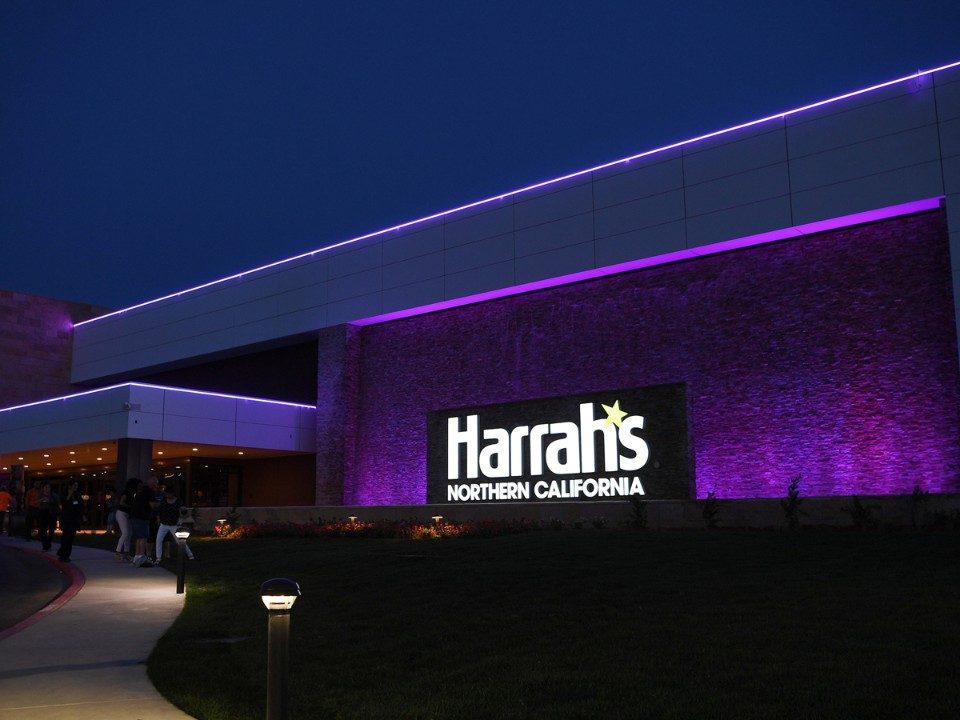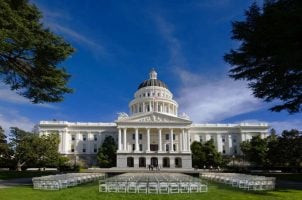Caesars Vows to Stay Neutral in California Sports Betting Fight
Posted on: August 2, 2022, 11:35h.
Last updated on: August 4, 2022, 02:56h.
Several entities are choosing sides in California’s sports betting debate. However, one major player in the gaming industry is choosing to sit this one out.

Caesars Entertainment CEO Tom Reeg explained why to investment analysts during the Tuesday Las Vegas-based company’s second-quarter earnings call. He cited the “decades-long relationship” Caesars has with several tribal nations as the operator of their casinos. That includes the Rincon Band of Luiseño Mission Indians and the Buena Vista Rancheria of Me-Wuk Indians in California.
Most tribal gaming nations in California are backing Proposition 26, a measure on the Nov. 8 general election ballot. That question would allow tribal casinos and racetracks to offer retail sportsbooks. It also would allow tribal casinos to offer roulette and dice-based table games.
Next to Prop 26 on the California ballot will be Proposition 27. That initiative is backed by seven national sports betting operators who want to legalize online wagering statewide. Among those involved in the campaign are FanDuel, DraftKings, and BetMGM – operators that, along with Caesars, are generally recognized as the top four sports betting operators nationally.
We don’t want to be in opposition to tribal interests when we’re their partner,” Reeg said. “So, we’ve remained neutral in California throughout. You should expect that to be the case in any state where tribes are at odds with the commercial interests.”
Should either initiative or both pass, Reeg indicated, Caesars would be involved in California sports betting. With nearly 40 million people in the state, it represents the largest market for US wagering.
“I struggle to think of a jurisdiction we would not go to in the US if it opens,” he told the analysts.
Bitter Campaign Likely
There are 13 weeks until voters go to the polls in the Golden State. All signs indicate the campaigns for and against the two measures will be hard-fought and costly.
Four groups registered with the state have already reported more than $230 million in contributions. And the rhetoric increased earlier this week. That’s when “Californians for Solutions for Homelessness and Mental Health Solutions,” the pro-Prop 27 group backed by $100 million from the national sportsbooks, released an ad that called out “wealthy” tribes for opposing the measure.
Besides providing funding for social services, “Californians for Solutions” also tout their measure as a way to bolster economic development for smaller tribes. The initiative calls for 15% of the tax revenue generated by online sportsbooks to go to a fund to aid tribes not involved in sports betting.
Prop 27 also requires national sports betting apps to partner with an in-state tribe to secure a license. It also allows tribes to operate online betting apps, albeit with restrictions.
Not long after the ad was released, several tribal leaders in the state denounced the ad.
“It’s shameful to attack tribes that have a proven track record of sharing hundreds of millions with limited and non-gaming tribes like mine,” said Glenn Lodge, Chairman of the Chemehuevi Indian Tribe. “These out-of-state corporations should stop the divisive and misleading attacks.”
NAACP Sues to Block ‘Misleading Statements’
There have been a few lawsuits filed in California over the initiatives, with those coming from state-licensed cardroom casinos opposing the tribal measure. But on Tuesday, the California-Hawaii State Conference of the NAACP filed another lawsuit in Sacramento.
The civil rights group accuses opponents of Prop 26 of trying to mislead voters by including a comment from Minnie Hadley-Hempstead, a 40-year member of the Los Angeles branch of the organization. In the suit, the state branch said it supports Prop 26 and that Hadley-Hempstead was deceived into issuing a statement.
“We are suing to prevent their misleading statements from appearing in the voter information guide sent to tens of millions of voters,” Rick Callender, president of the California-Hawaii State Conference, said in a statement.
Related News Articles
Most Popular
LOST VEGAS: ‘Tony The Ant’ Spilotro’s Circus Circus Gift Shop
Las Vegas Overstated F1 Race’s Vegas Impact — Report
Mega Millions Reportedly Mulling Substantial Ticket Price Increase
Las Vegas Strip Stabbing Near The Strat Leaves One Man Dead
Most Commented
-
End of the Line for Las Vegas Monorail
— April 5, 2024 — 90 Comments -
Mega Millions Reportedly Mulling Substantial Ticket Price Increase
— April 16, 2024 — 8 Comments -
Long Island Casino Opponents Love New York Licensing Delays
— March 27, 2024 — 5 Comments
















No comments yet